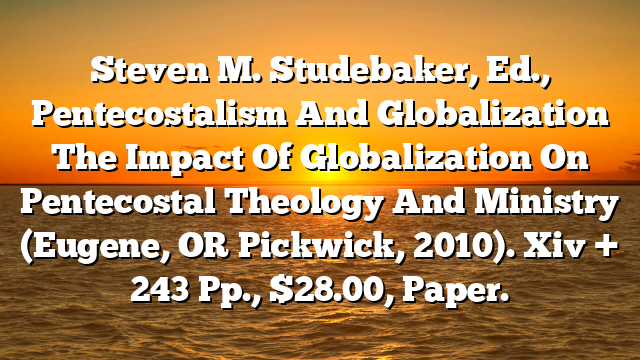158
Book Reviews / Pneuma 34 (2012) 95-159
Steven M. Studebaker, ed., Pentecostalism and Globalization: The Impact of Globalization on Pentecostal Theology and Ministry (Eugene, OR: Pickwick, 2010). xiv + 243 pp., $28.00, paper.
This volume is comprised of papers presented by various scholars at the Pentecostal Forum at McMaster Divinity College in October, 2008, and by Indian Pentecostal theologian, Ivan Satyavrata, at the J. Philip Hogan Lectureship of the Assemblies of God Theological Semi- nary in 2009-2010.
The Introduction by Studebaker and Nikola T. Caric acknowledges two phenomena: 1) the global roots and current global nature of Pentecostalism, and 2) how globalization has increasingly become a part of human life and experience in the twenty-first century. These open up to the purpose of this volume: to “outline the nature of the global Pentecostal move- ment and explore ways it can speak to North American Pentecostalism” (2). The main thesis is that both Pentecostalism and Christianity, as “supraterritorial” phenomena, face unique challenges in a global world. Yet the Introduction also notes the historic uni-directional flow of Western theology. Theological education in many non-Western contexts tends to use Western texts rather than indigenous texts, thus creating a sense of Western theological superiority. But contrary to this trend, there are shifting tides in Africa and elsewhere where local exegetical methodologies are now being used alongside, and in competition with, the Western methodologies that have dominated theological education until recently.
The rest of the book is divided up into three sections. The first focuses on the global his- tory and nature of Pentecostalism and observes the continued interface between the phe- nomena of globalization and Pentecostalism. Allan Anderson begins this section by contending for the polycentric origins and missionary ethos of Pentecostalism and contin- ues in his second essay by exploring Pentecostalism’s significance and trends which have led it to become a global phenomenon. Michael Wilkinson adds the third essay to this section which highlights how “concepts of globalization can help North American Pentecostals in general and Canadian ones in particular to understand their internecine doctrinal struggles, and shows the way globalization has influenced, implicitly and explicitly, contemporary Pentecostal theology and history” (22).
By using Spirit baptism as a case study, the two chapters in part two, written by Steven Studebaker and Randall Holm, examine how global trends theologically impact Pentecostal issues and what North American Pentecostals can learn from the global Pentecostal move- ment. In the third section, Byron Klaus and Satyavrata draw from global Pentecostalism and the nature of globalization to propose new ways of Pentecostal leadership, ministry, and mission praxis. “Their goal is to suggest ways that an awareness and appreciation of the global movement can help re-envision Pentecostal leadership and ministry primarily, but not exclusively, in the North American setting” (23). David Reed’s essay wraps up the vol- ume by probing the implications raised and evaluating the constructive proposals set forth in sections two and three.
Since a majority of the world’s Pentecostals do not live in the West, this volume rightly raises the often overlooked issue of what the West can learn from global Pentecostalism and global theological education. Given the rapid growth of Pentecostalism in the global South and decline in the global North, from both a theological and leadership perspective,
© Koninklijke Brill NV, Leiden, 2012 DOI: 10.1163/157007412X622021
1
Book Reviews / Pneuma 34 (2012) 95-159
159
it is problematic for theological education in the Southern Hemisphere to primarily uti- lize Western texts, methodologies, worldviews, and pedagogies with little or no indigenous input. Hence, this book correctly suggests that traditional, Western theology is incom- plete without broader, global Pentecostal influences. It seems paternalistic for the West to impose their views on the South when the latter, in fact, may have important insights into the biblical texts because, in some cases, their worldview more closely mirrors that of the biblical world.
However, several quibbles can be raised. First, this collection of essays, although rewrit- ten for publication, do not support the thesis of the book spelled out in the introductory chapter. The important themes identified there could have been better developed by more examples and strategic steps of implementation.
Second, all of the authors have received advanced degrees primarily from institutions that rely heavily on the very Western methodologies the editors suggest need to be inte- grated with indigenous perspectives. Perhaps it takes those kinds of credentials to speak with authority in the West, but it seems ironic that a more diverse set of worldviews was not presented. Most representative of voices from the global South is Satyavrata. However, with the exception of several anecdotal references to indigenous sources and ideologies, it seems as though his three chapters are more geared towards the white, middle-class, classical Pen- tecostal audience where they were first presented, versus advancing the editors’ thesis as well as he could have. Much more could have been presented from indigenous leaders about how theological education should be revamped to serve their needs and contexts. Given the global world in which we all live, integrating the best from the West and South will provide Pentecostal leaders with the necessary intellectual and apologetic tools, which, when combined with Pentecostal spirituality and praxis, could empower the church. Only a comprehensive approach, where global Pentecostal leaders learn from each other as col- leagues, will allow for the best expression and advancement of global Pentecostalism. West- ern and Southern Pentecostal theologies will always have differences, and local customs will dictate that. However, globalization and immigration spurs us in the West to learn from our Southern brothers and sisters just as they have learned from us, for the advancement of Pentecostal theology and ministry in the twenty-first century.
Reviewed by Seth Zielicke
PhD Student
The University of Birmingham, Birmingham, England [email protected]
2

Leave a Reply